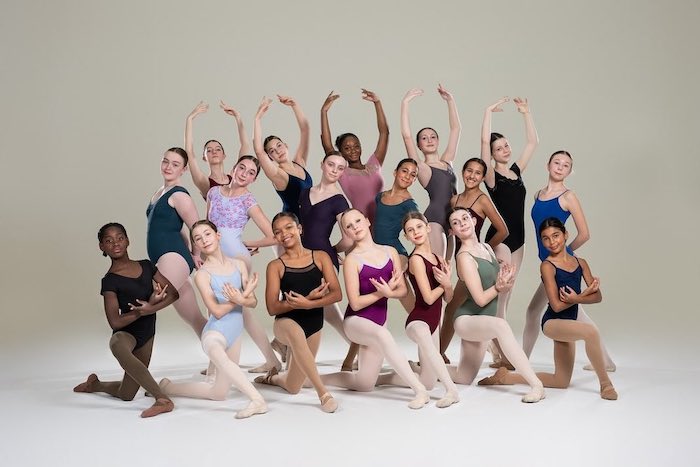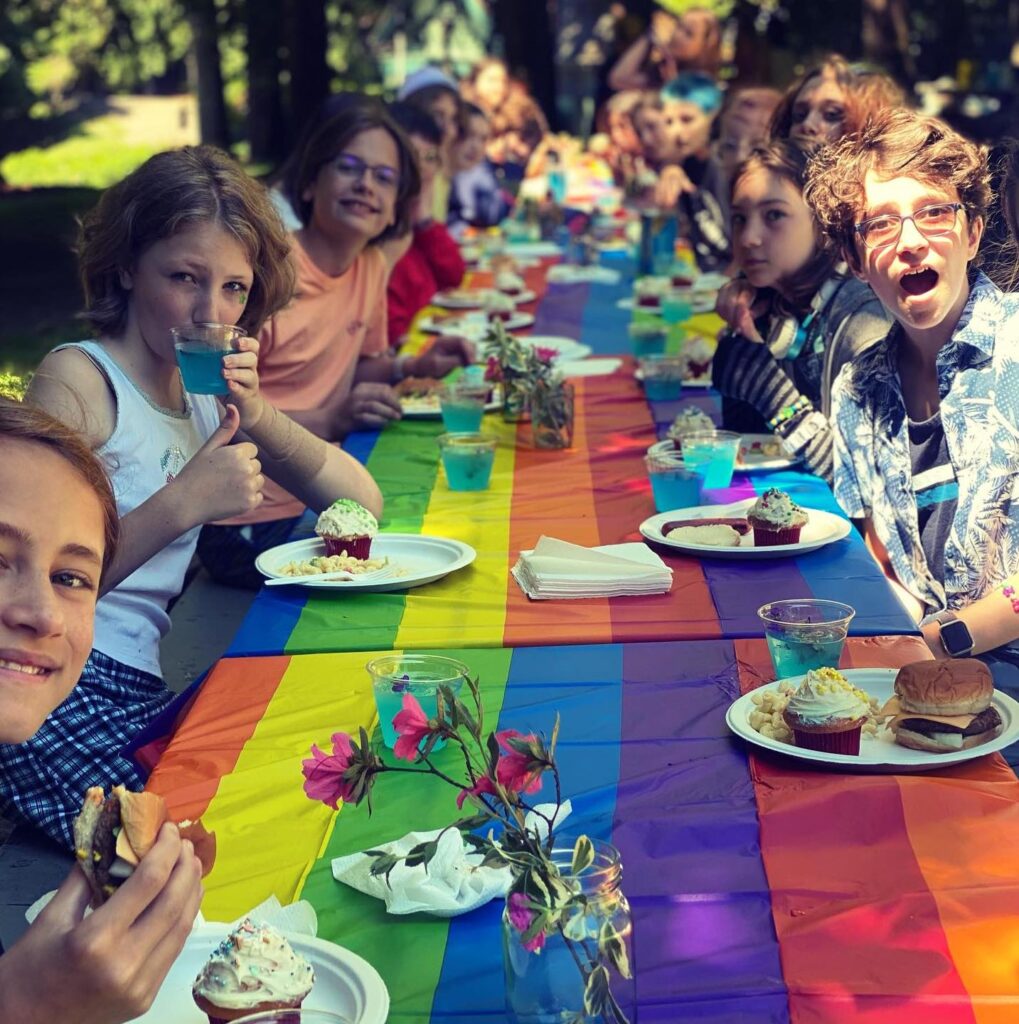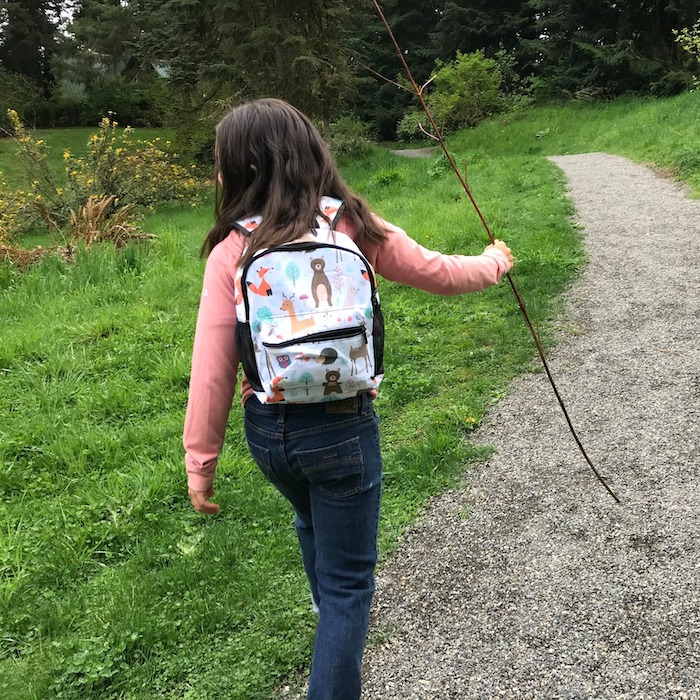Find a welcoming environment, playtime and activities at these organizations aimed at building community for LGBTQ+, BIPOC and neurodivergent families.
A new kid-friendly venue or community space just opened and your family decides, yes, let’s check it out! You coordinate schedules and pack snacks while weathering moans and groans from your kids. You finally get out of the house and load everyone into the car. You argue about who gets to choose the music. And when you arrive at your destination, you’re faced with one of two outcomes: maybe your children get to connect with other kids their age, have a blast, and enjoy a new experience. Or, you might feel immediately uncomfortable, unwelcome, excluded and overwhelmed. Exploring new meet-ups, groups or clubs with your kids is never simple. But for the many LGBTQ+, BIPOC and neurodivergent kids and families, your experiences might unfortunately fall into the second category more often than not.
Enough negative experiences might deter you from trying something new — but fear not, we’ve done the research for you! We heard from parents, kids, and other trusted adults and identified some of the most welcoming, safer spaces for LGBTQ+, BIPOC, and neurodivergent kids and families in the Portland area. Read on for some standout spots, as well as a list of other resources and groups your family might be interested in checking out.
STEPS PDX

When you think of ballet, you might not immediately think of “inclusive.” Images of tall, thin, white dancers with a certain body type; classic performances like Swan Lake and The Nutcracker centering around heterosexual romantic love; and a level of intense focus, discipline and commitment that pushes dancers to their physical, mental and emotional limits might pop into your head instead. But talking to 17-year-old Sean Hobbs and his mother, AJ McCreary, about their experiences at STEPS PDX demonstrates the possibilities and future of dance as a truly inclusive environment.
STEPS PDX is a dance studio in Ladd’s Addition, offering youth and pre-professional classes (ballet, modern dance and hip hop). But it’s more than a dance studio, really; Hobbs describes a deep sense of community at STEPS, and identifies it as a true outlet to express yourself.
What makes STEPS so special are its offerings geared toward BIPOC youth, and intensive efforts to be an inclusive, thoughtful and holistic studio. The majority of dance teachers are BIPOC, and many staff identify as queer. “BIPOC students have less access to spaces like this,” Hobbs says. “We don’t get messaging that it’s for us.”
McCreary confidently describes STEPS as “the most diverse dance studio in Portland.” It’s clear this is intentional — from STEPS’ BIPOC Youth Dance Program (which provides 10 months of lessons in ballet, creative movement and tap for only $200, and scholarships are available) to DanceAbility (a weekly offering for mixed-ability dancers), the studio envisions a future for the dance world that turns no one away, while also being rigorous artistically.
CampOUT

Summertime can be a challenging season for LGBTQ+ youth. Many have a strong support system through programming at their schools; at the end of the school year, it can be scary leaving those supports behind. Thankfully, Portland has a great option for them: CampOUT.
Founded last spring by Erin Savage, a former Portland Public Schools teacher, CampOUT’s mission is to provide a safe space for LGBTQ+ middle schoolers to build community with each other, and to help them curate the social-emotional skills and self-esteem necessary when life gets hard. Savage hopes to “surround kids with joy, mindfulness practices, physical activity, nature, community building, hobbies and all around the best parts of life experiences.”
Participants start each day of their week-long CampOUT session at 9 am with activities like yoga or meditation, then spend time in both structured activities like cooking, zine making and theater games. Campers also visit Laurelhurst Park every day to enjoy long walks and workshops led by special guests. Camp ends at 3 pm with time for unstructured hanging out, journaling and art. Both full and partial scholarships are available to cover the $480 a week cost of camp.
Former participants of CampOUT call it a “fun and safe space to be yourself,” where LGBTQ+ young people can “express [themselves] however [they] feel comfortable.” More than just a day camp, it’s “a queer hangout … where you can be yourself without judgment.”
At the end of the summer, CampOUT collects survey results to continually improve their offerings. Last year, an increase of 51% of BIPOC participants and 30% of overall participants agreed with the statement, “I feel part of a community,” compared to the beginning of the summer. Even more telling, 48% of BIPOC participants and 42% of participants campwide agreed that “life has meaning,” after CampOUT.
Wild Recess

When you come to Wild Recess for the first time, you’ll immediately appreciate the way that multiracial, queer and neurodivergent families and children are united around a common passion for nature and community. (You’ll also notice that everyone is masked; although each family masks for different reasons, many have immunocompromised or otherwise high-risk family members, so masks continue to be required for participation in Wild Recess.)
Wild Recess is a free, volunteer-run meet-up founded by Jessica Parsons in September 2021 with the vision of connecting children to nature. “Our first members had been starved of social interaction since the onset of COVID. Over that first month of weekly meet-ups we observed something amazing. … Our children didn’t need scheduled snack time, story time, or planned activities presented to them. They needed recess.”
Nowadays, 10 to 15 families gather for “recess” twice a week on Tuesday mornings and Thursday afternoons in a private forest park, and occasionally at the Oregon Zoo or other nature spots. A typical day at the Wild Recess gathering in the Southwest Portland woods is anything but typical. Older kids like 12-year-old Hazel, who identifies as neurodiverse and non-binary, play games, or just hang out and talk. Younger children engage in imaginary play, interact with nature and work on crafts. And, according to one mom, “the grown-ups get just as much out of the meet-ups as the kids. We spend our time talking through the highs and lows of parenting … and offering lots of mutual support.”
What makes Wild Recess truly unique is the lack of adult-imposed structure. Even though parents are required to be present for the meet-ups, kids just get to be kids, and can connect with each other and with nature in the ways that feel best for them. All ages are welcome (although the majority of kids are between 5 and 13 years old), and diversity is embraced — the majority of families have a parent or child who identifies as LGBTQ+, BIPOC or neurodivergent. Wild Recess families are a tight-knit community, and see the value of their safe space as providing room to handle conflict, missteps, or unsafe behaviors in kind, compassionate ways, without judgment. Clear communication and openly talking through things means no participants worry that they are going to be shamed for how they feel, think or process.
“In a world full of ugliness, we need some beauty, and Wild Recess is that beauty,” says parent Kortni Johnson, who has participated in Wild Recess with her four kids for the past six months. “It has been life changing.”
More Portland Safe Spaces
Alder Commons
What: Various classes, meet-ups, and programs — art exhibits, cooking classes, storytimes, and more
When: Days and times vary; check their website
Books With Pictures
What: BIPOC Chill Hours
When: Every second, third and fourth Sunday from 4-6 pm
What: Queer + Trans Youth Safe Space
When: Fridays, 3-5 pm
Black and Beyond the Binary
What: Umoja Kijana Shujaa leadership cohort
When: Days and times vary; check their website
Brown Girl Rise
What: Various events such as workshops, book clubs and support groups
When: See their Instagram @browngirlrise for dates
Centro Cultural
What: Robotics Team
When: Every Sunday, 9 am-12 pm
Columbia Dance
What: INCLUDE (Inspiring with no Challenges or Limitations, the Universality of Dance Experiences)
When: Contact for upcoming session info
Pro tip: Check out their sensory-friendly performance of The Nutcracker each December
Club EMU
What: Game Club
When: Second Fridays, 6:30-9:30 pm
What: Clubhouse event
When: Third Wednesdays, 6:30-8:30 pm
The Living Room
What: LGBTQIA2S+ Youth Meet-up
When: Wednesdays, 4-6 pm
Multnomah County Libraries
What: Preschool Sensory Storytime
When: Various locations, days, and times; check their website
What: Teen & Tween GSA
When: Monthly at Sellwood-Moreland Library; check their website
NAYA Family Center
What: 9th Grade Counts Summer Camp
When: Days and times vary; check their website
What: Two Spirit Safe Space Alliance
When: Register for more info
What: Camp Rise Day Camp
When: Check their website
North Clackamas Parks & Recreation District
What: Adaptive and inclusive recreation
When: Days and times vary by activity; check their website
PFLAG Portland
What: Support groups
When: Days and times vary; check their website
Portland Parks & Recreation
What: Adaptive and inclusive recreation
When: Days and times vary by activity; check their website
Portland Youth Build
What: Construction and technology courses
When: Days and times vary by activity; check their website
Project LEDO
What: Lego Robotics
When: Days and times vary; check their website
Reframe Collective
What: Re.Imaginaries Pre.School
When: Monday-Thursdays, 9 am-1 pm
What: The Rainbow School
When: Days and times vary by cohort and age group; check their website
What: The Tool School
When: Days and times vary by event; check their website
SMYRC (Sexual & Gender Minority Youth Resource Center)
What: Open hours
When: First and third Wednesdays and second and fourth Fridays, 4-7 pm
What: BIPOC Affinity Night
When: Once a month, 4-6 pm; check their online calendar
Spectra PDX
What: Gymnastics and ninja programs
When: Weekly classes, times vary; check their website
Speak and Be Heard
What: Summer theater camp for neurodiverse children
When: July 8-August 1, Monday-Thursday, 9 am-1 pm
Third Eye Books, Accessories, & Gifts
Open Tuesday to Saturday, 10 am-6 pm
TransActive
What: Family and youth support groups
When: First and third Saturdays, times vary; check their website
Tualatin Hills Park & Recreation District
What: Adaptive and inclusive recreation
When: Days and times vary by activity; check their website
Wild Diversity
What: QTBIPOC Youth Summer Camp
When: Days and times vary; check their website
- Everything You Need to the Know about the PPS School Lottery - December 23, 2024
- Your Guide to a Not-So-Scary Halloween - October 14, 2024
- How Are Our Students Doing Post-Covid? - August 6, 2024
